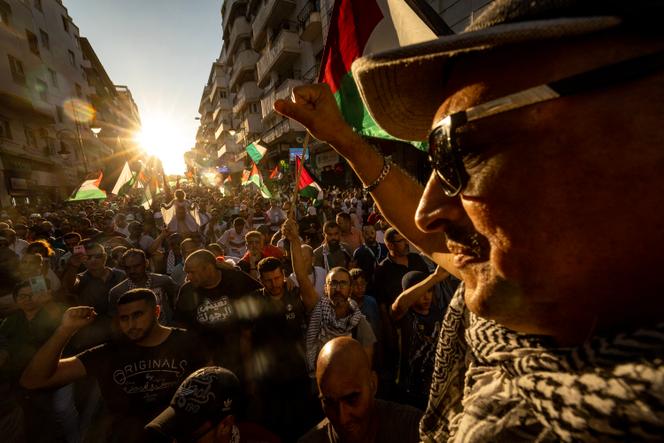


Karim (not his real name) can't believe it. "We thought we'd collect 300 or 400 signatures, but we ended up with almost 1,300," bragged this political science graduate from Mohammed VI Polytechnic University (UM6P). In a letter sent to its president on May 27, 1,256 students and graduates of the institution called for "the severing of ties" between the private higher education establishment, owned by the Office Chérifien des Phosphates (OCP), and "its Israeli partners," as in December 2020, Morocco and Israel agreed to resume official relations.
Their main grievance: the partnership agreements signed by the UM6P with eight Israeli universities known for conducting, according to them, research programs with the country's army or security services – such as the Institute for Internal Security Studies at Ben-Gourion University in the Negev. They are "directly involved in crimes and flagrant violations of the fundamental rights of the Palestinian people and of human rights in general," criticize the signatories, who have joined forces to form a "movement against academic normalization."
The initiative – a first at UM6P – comes as something of a surprise at a private institution, one of the most renowned in Morocco, which was inaugurated in 2017 by King Mohammed VI and where his son, Crown Prince Hassan, is studying. The petition was particularly well supported by students, say the initiators of the movement, who put their numbers at "around a thousand," or almost one fifth of the university's student body.
All the names of the signers are apparently known to the administration, claimed the protesters, who pointed out that a member of the UM6P management board met with several of their representatives on June 20, along with an OCP group mediator. "He was embarrassed and made us understand that such a decision [to break with the eight Israeli universities] could not be made by UM6P," said one participant. The school administration did not respond to our requests for comment.
Over the last few days, fear of possible action by the movement within UM6P led to the cancelation of a long-planned graduation ceremony. The event scheduled for Friday, July 12, at the Faculty of Governance, Economics and Social Sciences (FGSES) was "abruptly canceled" the day before, stated the petitioners. "The wearing of keffiyehs and the reading of messages in support of the Palestinian cause were planned." According to one student, the administration cited "technical and logistical reasons."
At public universities, graduation ceremonies at which students were planning to wear pro-Palestinian symbols were also canceled, as well at the Faculty of Letters and Human Sciences (FLSH) at Mohammed V University in Rabat. On July 13, the dean of the Higher School of Technology (ESTC) at Hassan II University in Casablanca refused to award a distinction to a student "because she was wearing a keffiyeh," according to the Moroccan Union for Higher Education and Scientific Research (SMESRS) in a press release.
In addition to students, teaching staff have also mobilized in some places. On May 31 in Tétouan, more than 600 professors and administrators from Abdelmalek Essaâdi University sent a petition to its president, demanding that relations with Haifa University be severed. "He assured us that it was a simple cooperation protocol [signed in September 2022], that nothing concrete had taken place and that he would ask for its cancelation at the next meeting of the university council," claimed SMESRS member Noureddine Elmtili, one of the signatories.
A similar petition is reportedly in preparation at the Agronomic and Veterinary Institute Hassan II (IAV) in Rabat, one of Morocco's largest institutions. Professor Mohamed Naji stated that it would be submitted to the administration at the start of the new academic year, adding that students are also preparing a letter of protest. At issue is an agreement signed with the Hebrew University in Jerusalem, stressed the local SMESRS representative, who criticized the situation in Gaza and the West Bank, as well as the one-way cooperation between Rabat and Tel Aviv.
"Morocco has had agricultural relations with Israel for over 30 years. Despite this, we remain a mere outlet market for Israeli inputs, with no real transfer of technology and extreme dependence when it comes to vegetable seeds and drip-type equipment," pointed out the professor, who described the Israeli companies Netafim, Hazera and Mehadrin as having a virtual monopoly in the kingdom.
More generally, the partnerships forged by Moroccan universities with Israeli establishments or research centers have been described by the protesters as "fictitious agreements" or "lacking in transparency," with some not being the subject of any internal communication. Most of them have been set up "for political reasons," warned Karim. Most of them are not active, said the professors.
The academic year is over, and Moroccan campuses are empty, but the activism is continuing, said the petition writers. A student front against academic normalization is reportedly being created, encompassing both public and private institutions, including the International University of Rabat (UIR) and the Euromed University of Fez (UEMF), which, like UM6P, have established partnerships in Israel. "It's going to be a heated start to the new academic year," promised trade unionist Hamid Abchir, former deputy director of ESTC.
These protests from the academic world come as Morocco continues to strengthen its defense ties with Israel. According to the Israeli press, Rabat is to acquire two Ofeq-13 observation satellites from the state-owned Israel Aerospace Industries (IAI) to replace the Mohammed VI-A and Mohammed VI-B models designed by Airbus and Thales. Valued at one billion dollars, this is the largest defense contract signed by Rabat since normalization with Tel Aviv.
Translation of an original article published in French on lemonde.fr; the publisher may only be liable for the French version.
